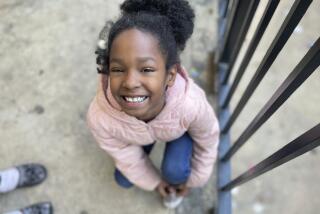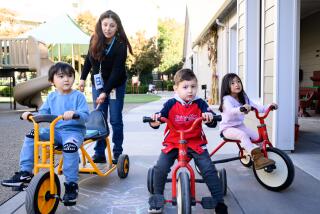Children Learn Lessons by Staying Away From School : Education: Up to a million American families maintain home-schools where their children are taught. Their motive is usually religious.
- Share via
DORR, Mich. — In the living room of the modest two-story farmhouse of Peter and Ruth Nobel, five children are gathered around a piano and singing hymns.
The music signals the start of the school day for Charity, Luke, Hope, Samuel and Hannah Nobel. It also symbolizes the type of education their parents want for them.
“We try to live a God-centered life,” Ruth Nobel said. “It seems like the public schools elevate man and his reasoning above all things, where we consider God’s word to be the final authority.”
The Nobels, members of an independent Reformed church, consider public schools to be un-Christian places that do a mediocre job of educating. They also find a nearby Christian school unacceptable because of doctrinal differences.
They are among up to a million American families teaching their children at home, said Chris Klicka, senior counsel for the Home School Legal Defense Assn. in Paeoian Springs, Va. The association offers legal assistance to home-schoolers for a $100 annual fee.
Many cite religious reasons for keeping their children out of public schools, and some end up in court, said Klicka, whose group is involved in more than 30 cases nationwide protesting state restrictions on home-schoolers.
“We’re gaining ground,” he said. “Thirty-one states have passed bills permitting schooling at home, and 29 have done so since 1982.”
Michigan and Iowa remain the most restrictive states, with laws requiring certified teachers, Klicka said. Home-schoolers also object to laws in other states that require such things as teacher competence tests or college degrees.
Michigan’s law is being challenged in a case pending before the Michigan Supreme Court and has been altered by previous court decisions.
Jean Shane, education consultant for the Michigan Department of Education, said recent court decisions require the state to give teaching permits to people with bachelor’s degrees, even if they lack teaching certificates.
Parents who ask for a permit must report the names of the children being taught and the curriculum being used, Shane said.
About 700 filed reports this year, but Klicka said many never report for fear of being taken to court.
Ruth Nobel, a college graduate who won a court ruling allowing her to teach at home, began teaching her children more than 11 years ago with 22-year-old Abigail and now with 3-year-old Hannah.
The Nobel children begin their day with chores on the family’s 77-acre dairy farm about 25 miles south of Grand Rapids. Then they gather in the living room at 9 a.m. for hymns while Charity, 17, accompanies them on the piano.
The children grab their books and scatter to their separate study areas on the floors of their bedrooms, at the dining-room table or in the kitchen.
“Unless I have a problem, I don’t even go downstairs. I just work by myself. In a way, that’s better,” said Charity, who does her schoolwork sitting cross-legged on the floor of her tidy bedroom.
Economics, history, biology, government, algebra, English literature, typing and Bible fill about five hours of her day. The younger children spend about three hours a day on their studies.
Downstairs, Ruth Nobel spends a few minutes with each child.
Hope, at the dining-room table, recites for her mother a portion of “The Midnight Ride of Paul Revere,” which the 11-year-old sixth-grader has memorized. Then she takes a science test.
Luke, 14, has read a story at a small desk at the end of his bed and Ruth Nobel quizzes him about it.
Then the older children work independently while Ruth Nobel helps Samuel, a 7-year-old first-grader, read a story about Jesus walking on water.
“I think that they get the basics,” said Ruth Nobel, who has found herself brushing up on algebra and chemistry to stay ahead of her students.
Some of the children’s books and work sheets come from the Christian Liberty Academy in Arlington Heights, Ill., a private school that also operates a correspondence school for parents who teach their children at home.
The children follow a school year similar to a traditional school. They get report cards four times a year and take standardized achievement tests used by many traditional schools.
On a recent round of tests, their scores were at or above grade level in all areas.
“They aren’t being compared with other children their age,” said Ruth Nobel, who has taught as many as seven children at once. “They move at their pace and aren’t really that much aware that they are behind or ahead of others.”
One daughter is attending Calvin College in Grand Rapids and another graduated as a nurse. Ruth Nobel says they were as well-prepared as their classmates.
“There were a few things they had to catch up on, such as science laboratory work, but it was by no means impossible,” she said.
The children’s studies are supplemented by trips to the library, occasional field trips with other home-schooling families, softball games and volleyball matches.
More to Read
Sign up for Essential California
The most important California stories and recommendations in your inbox every morning.
You may occasionally receive promotional content from the Los Angeles Times.










